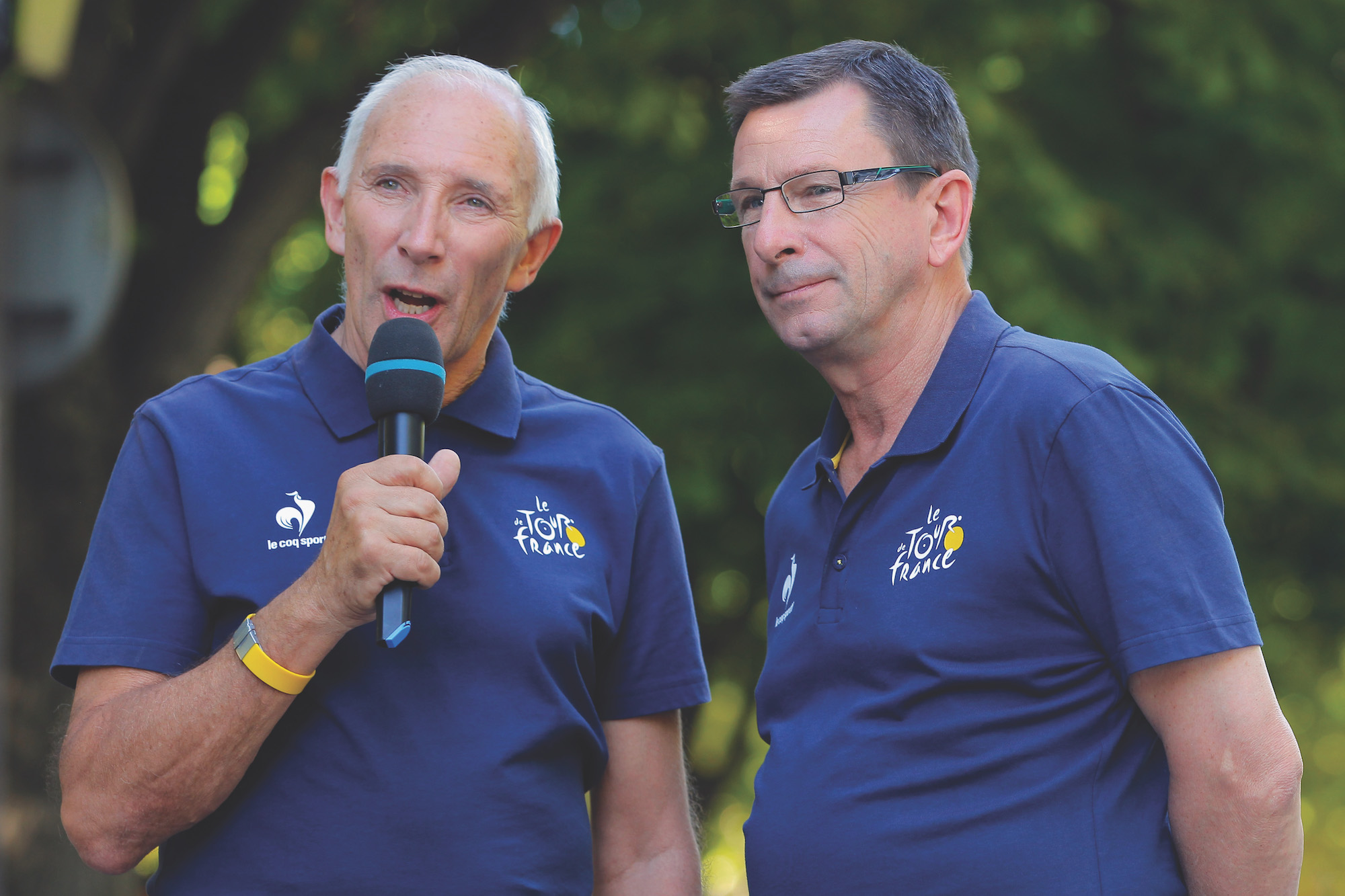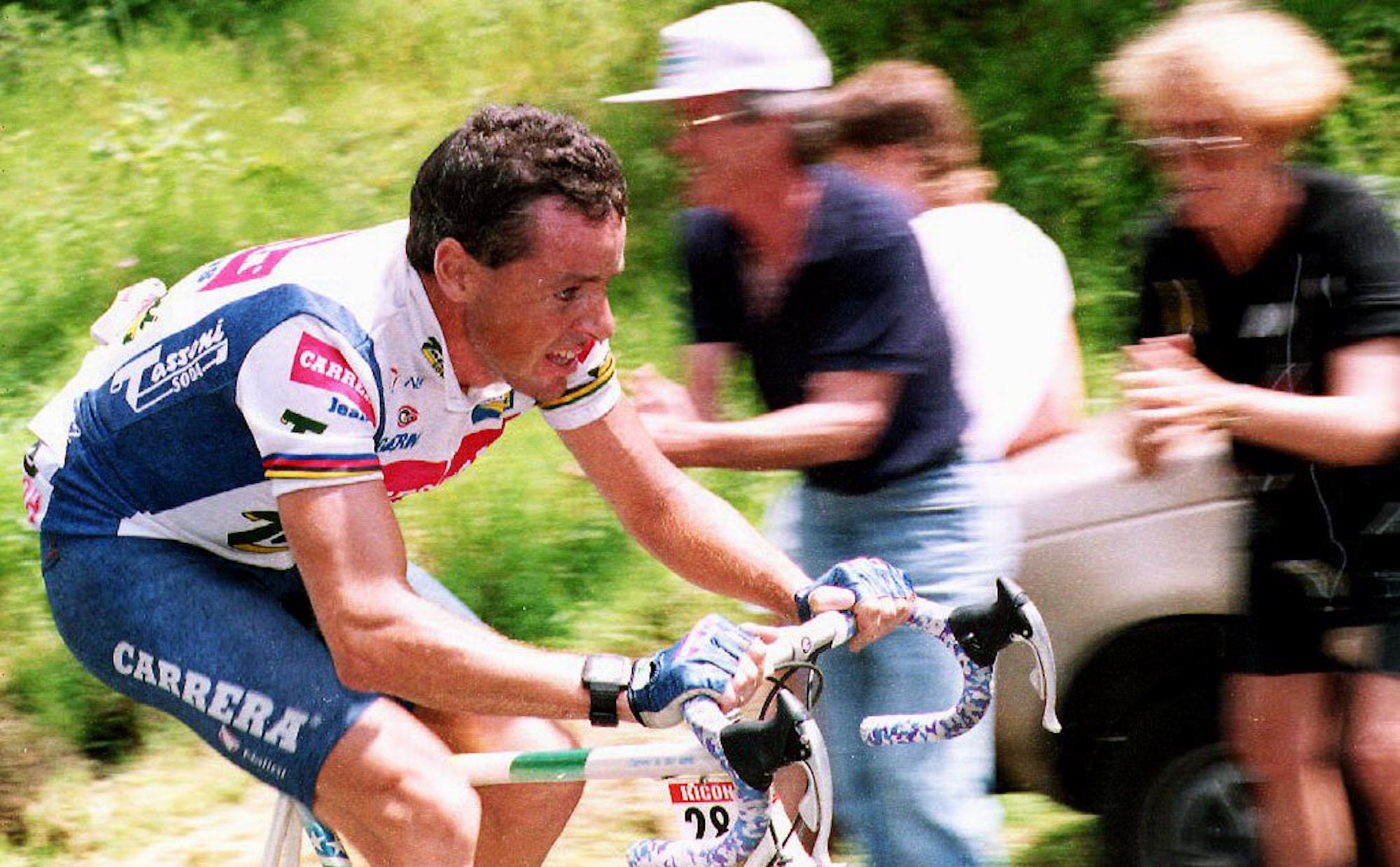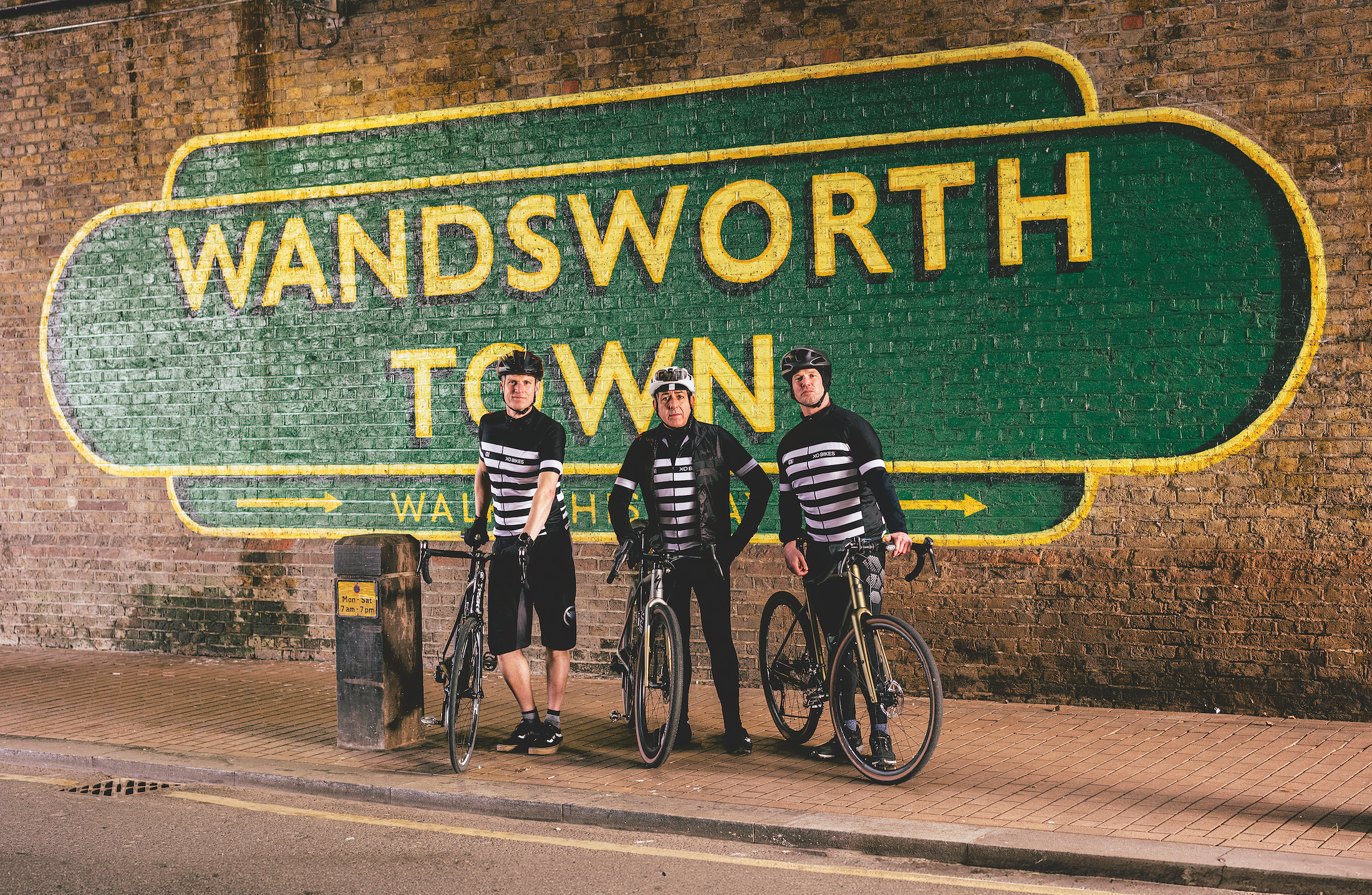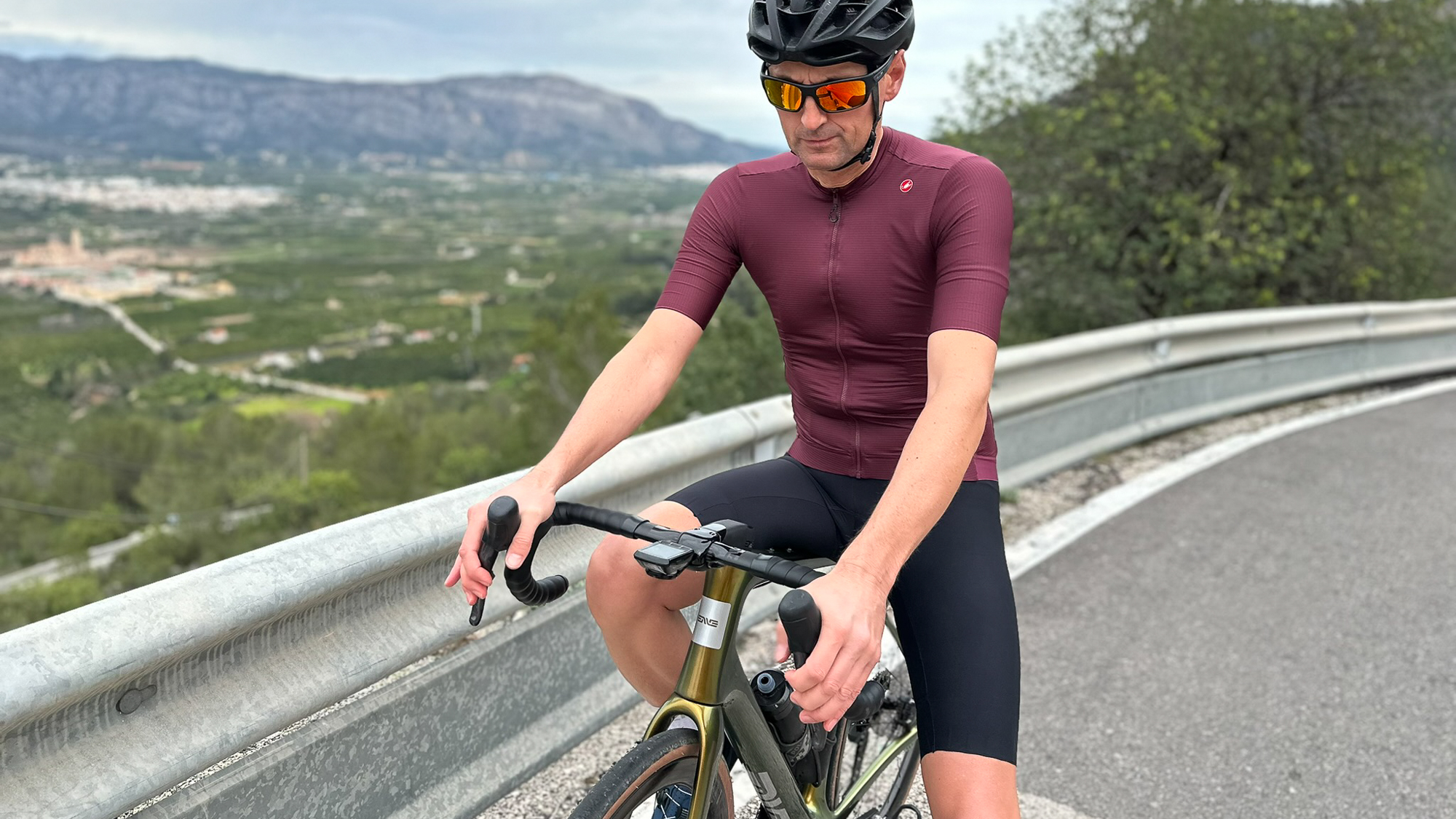'That looks like Stephen Roche! It is Stephen Roche!': The art of the commentator
CW speaks to the people who have voiced some of cycling's greatest moments about their early days behind the mic and the future of commentating

Phil Ligget and Paul Sherwen (Photo by Doug Pensinger/Getty Images)
The star of Italian great Felice Gimondi was already fading by the time he took to the startline of the Crystal Palace Grand Prix one cool, but sunny, April morning in 1978.
The race itself was a fairly perfunctory affair, despite a star-studded startlist, but up high on a scaffold tens of feet in the air overlooking the action a completely new type of star was being born. However, the first breaths of a new life are not always smooth.
"When I climbed up, a guy comes up and tells me exactly about the commentary box," recalls commentator Phil Liggett. "I had no idea what it all meant. And he said, ‘Well, it’s quite simple, you’ve got two televisions, we call them monitors, when the pictures on each one match up, then you’re live.’ That was the only word of advice I got.
"When Dickie Davies [TV anchor] handed over to me, the pictures matched, John [the producer] shouted in my ear ‘Cue commentator’ and I didn’t do anything, I was watching the bloody pictures. I’d forgotten I was the commentator. Then a second time he says ‘Cue commentator’. The next time he shouted at me, ‘For f***s sake, Liggett, that means you!’ With those words in my ear, I struggled into life and stammered out, ‘Good afternoon and welcome to Crystal Palace.’"
Things didn’t get much better. Later in the broadcast, he’d go on to make his biggest commentary faux pas to this day. "I remember saying ‘…and now you’ve got Gerrie Knetemann breaking wind at the front,’" Liggett recalls, able to smile about it all these years later.
In the 42 years since that first appearance, Cheshire-born Liggett has gone on to become one of the most highly regarded commentators still doing it. But his gaffe-filled first day on the job serves to demonstrate that ‘calling’ a race, as the industry parlance goes, is a bit more complicated than just talking over some pictures. While fans might like to think we could do it, it’s far tougher in reality. Which begs the question: what makes a good commentator?
Anthony McCrossan, speaker (commentating for crowds at the finish) of the Giro d’Italia and commentator for Eurosport, among others, knows. Having seen his diary cleared "within a week" by the Covid-19 lockdown and the suspension of racing, he ran a competition to find some new commentating talent.
Get The Leadout Newsletter
The latest race content, interviews, features, reviews and expert buying guides, direct to your inbox!
>>> Subscriptions deals for Cycling Weekly magazine
"I think a good commentator adds to the pictures," sums up McCrossan. "The amazing commentators in the amazing sporting moments, they leave you with that feeling of you can still recite what they said 20 years later."
Having a degree of self-confidence is a prerequisite he says. McCrossan’s first attempt at commentary wasn’t behind a screen, but in front of a crowd; whichever way you look at it, it required a degree of courage. "It was a little crit in Winchester, where my dad was the promoter. And the commentator froze, and handed the microphone back to my dad, I just picked up and had to go."
There’s another key element you need before you start, explains Eurosport commentator Rob Hatch: "You need a good voice to be a commentator, you need a strong voice to be a good broadcaster, really… If your voice isn’t strong enough to attract attention and get people to listen to you, it doesn’t really matter what you’re saying, does it?"
He adds: "You might be having your little siesta watching the Tour
de France and somebody might crash. And you hear that little raised tone, that raised voice and it needs to attract your attention."
Not that that’s to be mistaken for there being a ‘right’ type of voice or delivery for a commentator. McCrossan explains that he’s done more live commentating at race finishes all over the world, often working alongside people whose native language isn’t English, and to crowds that are the same, so he says in his 20-years of doing it, he’s evolved to be a little slower and a little more deliberate in his words.
Liggett recalls Davies’s advice to him on the morning before his Crystal Palace debut: "‘Don’t change when you start talking to the public, stay exactly as you are.’ It was the same advice I gave to Paul Sherwen when he joined me in the 80s," he says. "A superstar like Peter Sagan, he wins Classics because he has just got the talent, he’s got the instinct. I think the same exactly applies to a commentator."
But the visceral reaction you can get as the voice of a sport is no better encapsulated than in Laura Winter’s experience. Winter mostly works as a presenter and journalist, but has a regular slot as the speaker of the Tour de Yorkshire and worked on US television in commentary, too. "Ultimately, that voice has got to be pleasant to listen to, that could very likely be personal preference," she says.
"One thing I will say is that I’ve seen the usual social media furore over female commentators being too high pitch to listen to. I just think it is absolutely absurd that people can say that, it is just grounded deeply in prejudice."
What you say, does, of course, matter and it’s an area where Liggett has made a name for himself with his unique turns of phrase that have even inspired a Phil and Paul bingo game among fans.
"I never set out to try and trick the public with Liggettisms. They just come out. I mean, I remember seeing the peloton go over the cobbles in Paris, and I talked about the roller coaster of pain, it just seemed a natural thing to say as they’re bouncing along. And it just came out."
He adds: “"Dancing on the pedals’ has been probably my most famous, but I try not to use it very often these days because it’s just silly to keep on saying the same things." Hatch backs this up, saying he forces himself to listen back to some of his commentary at least every six months to check he’s not using the same phrases over and over again.
That’s what you do when you’re perfecting what is a show. "To an extent it’s a performance you’re putting on," says Hatch. "Just as the riders are performing, and that’s not to say that you’re being extravagant, and trying to make it about yourself, because you shouldn’t be." McCrossan says his first live commentary gig left him so on edge that he was up until four in the morning from the adrenaline.
Winter adds: "I feel that you’ve got to kind of work with what’s happening around you [at the finish]. So if there’s music playing, work with the music instead of giving a constant stream of consciousness that never really rises or falls…. You don’t want to become part of the white noise."
Technical difficulties
As if considering all that wasn’t enough, prospective commentators have to learn the technical aspects of the job too, of which there many. Although some commentators are synonymous with a particular channel, they’re all freelancers and have to switch between different stations and production companies all with their own way of doing things.
Then there’s necessity of ‘hitting one’ when you’re being counted into an advert break, possibly while the race is still action-packed. There’s a whole bunch of other in-ear cues, too. "At Eurosport, they give you cues for highlights," says McCrossan. "For example, you’ll be saying something like, ‘We’re 100km from finish and the breakaway group is a group of four…’ But in your ear, they’ll say we want you to stop talking in five seconds. Four, three, two, one, stop talking. They cue you like that, because they need a cut point for the edit for the highlights."
The flip of this, is a commentator can be asked to reintroduce the action as it goes live in a new country, despite the fact that it may have been on air for two hours. They then have to try and do that in a way that isn’t too jarring to the existing audience.
That’s just the audio. The images are most often on a 14in monitor, not the palatial widescreens of domestic TVs and if they are actually at the race (an increasingly rare occurrence), it’s quite possible the sunlight is making it even more difficult to see. It’s not as easy to identify riders as it is from your sofa.
Elbow grease
Perhaps surprisingly, everyone CW speaks to says that their time spent in front of a microphone accounts for less than half of what they do. The rest is meticulous and painstaking preparation. Everyone has a different system for that note keeping, built through years of first-hand experience and research.
Winter says: "You do take pride in doing that as a commentator and as a host, because that race could be that rider’s big moment and if you haven’t got anything to say about them, then you’re doing them and the sport a bit of a disservice."
Liggett’s is probably the longest-running database. "I devised the system myself in the mid-80s on one of the very early Apple Macs. I got it with Paul when we were together on the Tour DuPont, and a guy came up, he was from Apple. And he said, ‘You should let me show you how to knock out this FileMaker Pro thing and you get everything on it. He showed me and so I made a file and now that file to this day (obviously I have modernised it), but to this day, I’ve got every cyclist, whoever wins a pro race on my file."
He says he does use stats from websites like ProCyclingStats but "prefers his own facts". "If this guy picks his nose and gets fined £50, it’ll be on his record on my file. You won’t find it anywhere else," he boasts.
He even has a separate one for the Tour de France with further historic detail, including what towns a rider has won stages in.
"Paul [Sherwen] is the only guy who I gave that information to. I’ve had many commentators come for the weekend saying, ‘Hey, that’s fantastic that programme, can you send me a copy?’ I look at them and say, ‘You can bugger off. That’s my whole life’s work in there.’"
Hatch says his prep for the Grand Tours will start in the autumn before and expresses frustration at the changes to the Giro d’Italia this year as he’d "done more prep than ever". With a good command of many languages, he’ll scour the foreign press each day to get info that might not be as readily available to a British audience.
>>> Cycling Weekly is available on your Smart phone, tablet and desktop
He too has a document with information on every rider in the pro peloton. "The information will vary, depending on the type of rider, how much we talk about them and normally what they’ve said. Obviously, there’ll be stuff about the team leaders and their ambitions, there’ll be the riders’ nationalities and ages, because that’s something that our bosses quite like as a way to draw people in," he explains. "You can have all this information, but not all of it is ever going to get used, and it shouldn’t get used. It should only be used when it’s relevant."
McCrossan also has a filing cabinet with his notes from every race he’s ever done, roughly two pieces of A4 paper each, which sounds remarkably brief by comparison, but there’s a reason for that. "I remember a producer at Eurosport telling me, ‘You do too much prep. It’s too noticeable in your commentary that you’ve done too much preparation.’ I was like, ‘Really?’ And he said, ‘Yeah, because it sounds like you’ve prepared what you’re talking about.’" He says he still does the leg work, but, echoing Hatch’s sentiments, is a bit more relaxed in how he uses it.
Filling time
Nowhere is that legwork more obvious than on a long flat transition stage of a Grand Tour. "Filling space and time is an art," says Winter.
McCrossan’s response is typical of those CW speaks to: "That’s when the best really come into their own, because you’re able to talk about subjects, bring new things in and bring in details about the region or some feature or talk to your analysts."
Liggett and his former partner Sherwen would turn into tour guides, with everything from wine recommendations to coffee stops. "I can understand people turning off. So you’ve got to have something else," he says. "You have got to have good stories, you’ve got to have some knowledge of where they’re racing. I used to get lots of emails from people wanting the full route of the Tour de France, so they can go and choose the holidays after the race is over."
He maintains it’s easier now that there are more cameras on the race to give you a more diverse set of things to talk about. "I’m sure half the time that the helicopter hears my commentary, I talk about things and they pop up on the screen. I know that is the case on the races like the Amgen Tour of California where we’re the host broadcasters, because the helicopters and the guys on the camera bikes follow my lead very often, but on the Tour de France I don’t think they hear me."
They all still make mistakes of course and things can easily go wrong. Hatch once memorably had to continue calling a Tour de France sprint finish as his commentary desk collapsed from under him.
The number one fear they all have though is getting a rider’s name wrong. McCrossan sheepishly recalls one such incident: "One cyclo-cross at Milton Keynes, we had everything going wrong that could have gone wrong – that’s my excuse. There was lots going on in my ear, there were engineers around and stuff. And for the first 10 minutes of the race, I called Sanne Cant, Sophie de Boer. She came up to me about a month later and said, ‘Hi I’m Sanne, I thought I’d say hello so you know who I am.’ I felt pretty small."
But when it goes right, it is of course highly memorable. Some are lighter moments. "One moment that sticks in my mind," says Winter, "is when Tom Dumoulin stopped to have a poo in the Giro and Rob Hatch went, ‘Oh no.’ I re-watch that sometimes just to make myself laugh."
Others are the stuff of legend. In that category, one stands head and shoulders above all others. "I remember it clear as a bell," says Liggett, when we ask him about stage 21 of the 1987 Tour de France. Yellow jersey wearer Pedro Delgado knew he needed to gain two minutes over second-place Stephen Roche by the top of the climb to La Plagne to have a chance of holding him off in the forthcoming time trial. Laurent Fignon, already well out of overall contention, had designs on the stage win, unwittingly creating a perfect storm for Liggett’s commentary.

"I found out later that they had a new producer for French television who forgot he was telling the world, not just the French about the Tour de France. Because Fignon, who had no bearing on the overall, was going to win the stage, the camera stayed with him on the mountain."
There was little race radio coverage until the closing kilometres of the stage. "We did not know where Roche was except what we had heard. He was off the back approaching the mountain. I was trying to explain to the viewers, ‘I’m sorry, but the real action is behind. Delgado was fighting to get these two minutes to win the Tour de France.’ After Fignon comes across the line, Paul pointed to the top of my little monitor, and there were two legs in amongst the cars. And I said 'That’s Roche! That’s Stephen Roche!' I was as surprised as anyone else. It was not expected, but the legs were obviously Roche’s."
Even retelling it all these years later, Liggett is still animated: "So Roche comes in, I think it was 10 seconds back from Delgado. What
a chase that must have been up the mountain that the director
never showed!"
On top of mastering all the challenges of having a great voice, to the technical know-how and the endless research, there is one key skill that all prospective commentators need and it’s one that perhaps those quick to criticise should be mindful of – silence. Because for all the stats, quips, clever turns of phrase, ours is one of the most luscious and beautiful sports on the planet.
It’s a lesson one of the late greats of cycling commentary, David Duffield, was keen to pass on to a young McCrossan, who remains full of reverence and affection for him.
"I remember one of his last ever commentaries on Eurosport I did alongside him because he was getting a bit older, he always wanted someone with him, and I happened to be around. I was there as his analyst. David was funny, he was an amazing broadcaster, but he would also do crazy things. We were doing Paris-Nice and he turned both our microphones off. He put his hands on the screen, totally covered them up. And just said: ‘Let the pictures breathe.’"
This feature originally appeared in the print edition of Cycling Weekly, on sale in newsagents and supermarkets, priced £3.25.

Thank you for reading 20 articles this month* Join now for unlimited access
Enjoy your first month for just £1 / $1 / €1
*Read 5 free articles per month without a subscription

Join now for unlimited access
Try first month for just £1 / $1 / €1
Having trained as a journalist at Cardiff University I spent eight years working as a business journalist covering everything from social care, to construction to the legal profession and riding my bike at the weekends and evenings. When a friend told me Cycling Weekly was looking for a news editor, I didn't give myself much chance of landing the role, but I did and joined the publication in 2016. Since then I've covered Tours de France, World Championships, hour records, spring classics and races in the Middle East. On top of that, since becoming features editor in 2017 I've also been lucky enough to get myself sent to ride my bike for magazine pieces in Portugal and across the UK. They've all been fun but I have an enduring passion for covering the national track championships. It might not be the most glamorous but it's got a real community feeling to it.
-
 "I'm learning a new living here." How bikes are helping ex offenders start afresh and rebuild their lives.
"I'm learning a new living here." How bikes are helping ex offenders start afresh and rebuild their lives.Bike mechanic training for inmates takes bikes and blokes with a past and gives them both a chance to have a future
-
 Castelli Espresso Bibshorts review: classy and comfortable
Castelli Espresso Bibshorts review: classy and comfortableThe Espresso Bibshort is a worthy entrant in Castelli's Espresso collection with subtle design and quality construction